- Home
- Georgette Heyer
Grand Sophy Page 19
Grand Sophy Read online
Page 19
He stiffened. ‘It is not difficult to perceive my cousin’s influence at work!’ he said. ‘Before her arrival in London, you would not have spoken so to me! My regard for Eugenia –’
‘If you loved, Charles, you would not talk of your regard for Eugenia!’
It was at this inappropriate moment that Dassett ushered Miss Wraxton into the room. Cecilia whisked her brother’s handkerchief out of sight, a tide of crimson flooding her cheeks; Mr Rivenhall turned away from the window, and said with a palpable effort: ‘Eugenia! We did not expect this pleasure! How do you do!’
She gave him her hand, but turned her gaze upon Cecilia saying: ‘Tell me it is not so! I was never more shocked in my life than when Alfred told me what had occurred last night!’
Almost insensibly the brother and sister drew closer together. ‘Alfred!’ repeated Mr Rivenhall.
‘He told me, when he drove home after the ball, that he could not choose but overhear what Cecilia had said to you, Charles. And Lord Charlbury! I could not believe it to have been possible!’
Loyalty, as much as the ties of affection, kept Mr Rivenhall ranged on the side of his sister, for he looked to be very much annoyed, which indeed he was, for he thought it inexcusable of Cecilia to have placed him in such a situation. He said repressively: ‘If you mean that Cecilia and Lord Charlbury have made up their minds to it they would not suit, you are quite correct. I do not know what business it is of Alfred’s, or why he must run to you with what he – overhears!’
‘My dear Charles, he knows that what concerns your family must be also my concern!’
‘I am much obliged to you, but I have no wish to discuss the matter.’
‘Excuse me! I must go to my mother!’ Cecilia said.
She escaped from the room; Miss Wraxton looked significantly at Mr Rivenhall, and said: ‘I do not wonder you are vexed. It has been a sadly mismanaged business, and I fancy we have not far to seek for the influence that prompted dear Cecilia to behave in a way so unlike herself !’
‘I have not the smallest conjecture as to your meaning.’
His tone, which was forbidding, warned her that she would be wise to turn the subject, but her dislike of Sophy had become such an obsession with her that she was impelled to continue.
‘You must have noticed, dear Charles, that our sweet sister has fallen quite under the sway of her cousin. I cannot think it will lead to anything but disaster. Miss Stanton-Lacy doubtless has many excellent qualities, but I have always thought that you were right in saying she had too little delicacy of mind.’
Mr Rivenhall, who had decided that Sophy was to blame for his sister’s conduct, said without an instant’s hesitation: ‘You are mistaken: I never made any such remark!’
‘Did you not? Something of that nature I think you once said to me, but it hardly signifies! It is a thousand pities that dear Lady Ombersley was forced to receive her as a guest at this precise time. Every time I enter the house I am conscious of a change in it! Even the children –’
‘It is certainly by far more lively,’ he interrupted.
She gave vent to rather an artificial laugh. ‘It is certainly less peaceful!’ She began to smooth the wrinkles from her gloves. ‘Do you know, Charles, I have always so much admired the tone of this house? Your doing, I know well! I cannot but feel a little melancholy when I see that ordered calm – a certain dignity, I should say – shattered by wild spirits. Poor little Amabel, I thought the other day, is growing quite out of hand! Of course, Miss Stanton-Lacy encourages her unthinkingly. One must remember that she herself has had a strangely irregular upbringing!’
‘My cousin,’ said Mr Rivenhall, with finality, ‘has been extremely kind to the children, and is a great favourite with my mother. I must add that it is a pleasure to see my mother’s spirits so much improved by Sophy’s presence. Have you any errands in this part of the town? May I escort you? I must be in Bond Street in twenty minutes’ time.’
In face of so comprehensive a snub as this it was impossible for Miss Wraxton to say more. Her colour rose, and her lips tightened, but she managed to suppress an acid retort, and to say with the appearance at least of complaisance: ‘Thank you, I have to call at the library for Mama. I came in the barouche, and shall be glad to take you up as far as your destination.’
Since this was Jackson’s Boxing Saloon, she could hardly have been expected to have been pleased, for she did not care for sport of any kind, and considered boxing a peculiarly low form of it. But apart from quizzing Mr Rivenhall archly for his obvious preference for a horrid prizefighter’s society than for her own she made no comment.
Cecilia, meanwhile, had fled, not to Lady Ombersley, but to her cousin, whom she discovered seated before her dressing-table, scanning a slip of paper. Jane Storridge was putting away her habit, but when Cecilia came into the room she seemed to feel that she was not wanted, for she gave an audible sniff, picked up Sophy’s riding-boots, and went away with them under her arm.
‘What do you suppose this can be, Cecy?’ asked Sophy, still studying with knit brows the paper in her hand. ‘Jane says she found it by the window, and thought it must be mine. What a funny name! Goldhanger, Bear Alley, Fleet Lane. I do not know the writing, and cannot conceive how – Oh, how stupid! It must have fallen out of the pocket of Hubert’s coat!’
‘Sophy!’ said Cecilia, ‘I have had the most dreadful interview with Charlbury!’
Sophy laid the paper down. ‘Good gracious, how is this!’
‘I find my spirits utterly overborne!’ declared Cecilia, sinking into a chair. ‘No one – no one – could have behaved with more exquisite sensibility! I wish you had not persuaded me to see him! Nothing could have been more painful!’
‘Oh, do not give him a thought!’ said Sophy bracingly. ‘Let us rather think what is to be done about fixing Augustus in some genteel occupation!’
‘How can you be so heartless?’ demanded Cecilia. ‘When he was so kind, and I could not but see how much I had grieved him!’
‘I daresay he will recover speedily enough,’ Sophy replied, in a careless way. ‘Ten to one he will fall in love with another female before the month is out!’
Cecilia did not look as though she found this prophecy consoling, but after a moment she said: ‘I am sure I wish he may, for to be ruining a man’s life is no very pleasant thing, I can tell you!’
‘Do you think it will rain? Dare I wear my new straw hat? I have a mind to flirt with Charlbury myself: I liked him.’
‘I wish you may succeed,’ said Cecilia, a trifle stiffly. ‘I do not think him a man at all given to flirting, however. The tone of his mind is too nice for such a pastime as that!’
Sophy laughed. ‘We’ll see! Do tell me which hat I should wear! The straw is so ravishing, but if it were to come on to mizzle –’
‘I don’t care which hat you wear!’ snapped Cecilia.
Eleven
The rest of the day passed uneventfully, Sophy driving Cecilia in Hyde Park in her phaeton, setting her down to enjoy a stroll with Mr Fawnhope, encountered by previous arrangement by the Riding House, and taking up in her stead Sir Vincent Talgarth, who only deserted her when he perceived the Marquesa de Villacañas’s barouche drawn up beside the rails that separated Rotten Row from the carriageway. The Marquesa, who was attracting no little attention by the number and height of the curled ostrich plumes in her hat, welcomed him with her lazy smile, and told Sophy that she found the shops in London wholly inferior to those in Paris. Nothing she had seen in Bond Street that day had tempted her to undo her purse-strings. But Sir Vincent knew of a modiste in Bruton Street who might be trusted to recognize at a glance the style and quality of such a customer, and he offered to escort the Marquesa to her establishment.
Sophy knit her brows a little over this, but before she had time to think much on the subject her attention was claimed by Lord Bromford. Civility obliged her to invite him to take a turn about the Park in her phaeton. He got up beside her, and after te
lling her how much enjoyment he had derived from the Ombersley ball, made her a formal offer of marriage. Sophy declined this, without hesitation and without embarrassment. Lord Bromford, disconcerted only for a minute, said that his ardour had made him too precipitate, but that he did not despair of a happy issue. ‘When your parent returns to these shores,’ he pronounced, ‘I shall formally apply to him for leave to address you. You are very right to insist upon so much propriety, and I must beg your pardon for having contravened the laws of etiquette. Only the strong passion under which I labour – and I must tell you that not the most forceful representations of my mother, a Being to whom I, in filial duty, tender the most profound respect, have had the power to alter my decision – only, as I have said, this passion could have induced me to forget –’
‘I think,’ said Sophy, ‘that you should take your seat in the House of Lords. Have you done so?’
‘It is strange,’ responded his lordship, swelling slightly, ‘that you should ask me that question, for I am upon the point of doing so. I shall be presented by a sponsor no less distinguished for his high lineage than for his forensic attainments, and I trust –’
‘I have no doubt at all that you are destined to become a great man,’ said Sophy. ‘No matter how lengthy, or how involved your periods, you never lose yourself in them! How charming the foliage is on those beech trees! Do you know any tree to rival the beech? I am sure I do not!’
‘Certainly a graceful tree,’ conceded Lord Bromford, patronizing the beech. ‘Hardly, however, to rank in majesty with the mahogany, which grows in the West Indies; or in usefulness with the lancewood. I wonder, Miss Stanton-Lacy, how many persons are aware that the lancewood supplies the shafts for their carriages?’
‘In the southern provinces of Spain,’ countered Sophy, ‘the cork oak grows in great profusion.’
‘Another interesting tree to be found in Jamaica,’ said his lordship, ‘is the ballata. We have also the rosewood, the ebony, the lignum vitae –’
‘The northern parts of Spain,’ said Sophy defiantly, ‘are more remarkable for the many varieties of shrubs which grow there, including what we call the jarales, and the ladanum bush, and – and – Oh, there is Lord Francis! I shall have to put you down, Lord Bromford!’
He was reluctant, but since Lord Francis was waving to Sophy, and showed every desire to speak to her, he was unable to demur. When the phaeton drew up, he climbed ponderously down from it, and Lord Francis leaped equally nimbly up into it, saying: ‘Sophy, that was a capital ball last night! What a lovely creature your cousin is, to be sure!’
Sophy set her horses in motion again. ‘Francis, does the cork oak grow in the southern provinces in Spain?’
‘Lord, Sophy, how should I know? You were in Cadiz! Can’t you recall? Who cares for cork oaks, in any event?’
‘I hope,’ said Sophy warmly, ‘that when you have done with being the worst flirt in Europe, Francis, you will win a very beautiful wife, for you deserve one! Do you know anything about the ballata?’
‘Never heard of it in my life! What is it? A new dance?’
‘No, it’s a tree, and it grows in Jamaica. I hope she will be as good-natured as she is beautiful.’
‘Trust me for that! But, y’know, Sophy, it ain’t like you to be boring on and on about trees! What’s come over you?’
‘Lord Bromford,’ sighed Sophy.
‘What, that prosy fellow you had up beside you just now? He told Sally Jersey last night how valuable guinea-grass was for horses and cattle: heard him! Never saw poor Silence so silenced!’
‘I wish she had given him one of her set-downs. I must put you down when we reach the Riding House, for Cecilia will be waiting for me.’
Cecilia and her swain were found at the appointed spot. Lord Francis sprang down from the phaeton, and it was he who handed Cecilia up into it, Mr Fawnhope having become rapt in contemplation of a clump of daffodils, which caused him to throw out a hand, murmuring: ‘“Daffodils that come before the swallow dares! ”’
Cecilia’s spirits did not appear to have derived much benefit from her meeting with her lover. His plans for their future maintenance seemed to be a trifle vague, but he had an epic poem in his head, which might win him fame in a night, he thought. While this was in preparation, he would not object, he said, to accepting a post as a librarian. But as Cecilia was unable to imagine that her father or her brother would feel any marked degree of satisfaction in giving her in marriage to a librarian, this very handsome concession on Mr Fawnhope’s part merely added to her despondency. She had gone so far as to suggest to him that he should embrace the profession of Politics, but he had only said: ‘How sordid!’ which did not augur well for this excellent scheme. When he had added that since the death of Mr Fox, ten years earlier, there was no leader a man of sensibility could attach himself to, this remark had only served to show her how very improbable it was that his politics would find more favour with her family than his poetic aspirations.
Sophy, gathering the gist of all this from Cecilia’s somewhat elliptical remarks, took up a buoyant attitude, saying: ‘Oh, well! We must find a great man who is willing to become his patron!’ which gave Cecilia a poor notion of her understanding.
Sophy was able to restore to Hubert the scrap of paper which had fallen from his pocket before going down to dinner that evening. Until this moment she had not thought much about it, but his manner of receiving it from her was so strange that it set up in her head various speculations which he was far from desiring. He almost snatched it from her hand, exclaiming: ‘Where did you find this?’ and when she explained, in the most temperate manner, that she thought it must have fallen out of the pocket of the coat she had mended for him, he said: ‘Yes, it is mine, but I did not know I had put it there! I cannot tell you what it signifies, but pray do not mention it to anyone!’
She could only assure him that she had no intention of doing so, but he appeared to be so much discomposed that some inevitable reflections were set up in her brain. These did not come to fruition until she saw him upon his return from his visit to his friend Mr Harpenden, when his demeanour was so much that of a man who had received some stunning blow that she seized the earliest opportunity that offered of asking him if anything were amiss. Mr Rivenhall, who had left London twenty-four hours earlier for Thorpe Grange, the estate in Leicestershire which he had inherited from his great-uncle, had not yet returned to London; but Hubert made it plain to his cousin that even had his elder brother been in London, not the direst necessity would have induced him to apply to him.
‘He has not minced matters! He told me in round terms that he would not – Oh well! no matter for that!’
‘I daresay,’ said Sophy, in her calm way, ‘that Charles might very likely say more than he meant. I wish you will tell me what has gone awry, Hubert! My conjecture is that you have lost perhaps a large sum at Newmarket?’
‘If that were all!’ he exclaimed unguardedly.
‘Well, if it is not all, I wish you will tell the full sum of it, Hubert!’ she said, with one of her friendly smiles. ‘I assure you, you are quite safe in my hands, for Sir Horace brought me up to think there was nothing more odious than to be the kind of person who blabbed secrets abroad. But I know that you are in trouble of some sort, and I do think I ought, if you will tell me nothing, to drop a hint in your brother’s ear, for ten to one you will make bad much worse if you go on in this way, with no one to advise you!’
He turned pale. ‘Sophy, you would not – !’
Her eyes twinkled. ‘No, of course I would not!’ she admitted. ‘You are so very loth to tell me anything that I am quite forced to ask you. Is it anything to do with a woman? What Sir Horace would call a bit of muslin, perhaps?’
‘Sophy! Upon my word – ! No! Nothing of that sort!’
‘Money, then?’
He did not answer, and after a moment she patted the sofa on which she sat invitingly, and said: ‘Do, pray, come and sit down! I don’t suppose it
is by half as bad as you fear.’
He gave a short laugh, but after a little more persuasion sat down beside her, and sank his head in between his clenched fists. ‘I shall come about. If the worst comes to the worst, a man may always enlist!’
‘True,’ she agreed. ‘But I know something of the Army, and I do not think that life in the ranks would suit you at all. Besides, it would very much distress my aunt, you know!’
It was not to be supposed that a young gentleman of Hubert’s order would readily confide his difficulties into the ears of a female, and that female not quite as old as he was himself; but after a good deal of coaxing Sophy managed to extract his story from him. It was not a very coherent tale, and she was obliged to prompt him several times during its recital, but in the end she gathered that he had fallen into the clutches of a moneylender. There had been some trouble over debts contracted during the previous year at Oxford, the full sum of which he had not dared to disclose to his brother, hoping, in the immemorial way of youth, to be able to discharge them himself. He had knowing friends who knew all the gaming-houses in London; quite a brief run of luck at French hazard, or roulette, would have set all to rights; but when, during the Christmas vacation, he had sought this method of recuperating his fortunes only the most unprecedented bad luck had attended his efforts. He still shuddered whenever he recalled those ruinous, and, indeed, terrifying evenings, a circumstance which led his sapient cousin to infer that gaming held little attraction for him. Faced with large debts of honour, already in hot water with his formidable brother for far smaller debts, what could he do but jump into the river, or go to the Jews? And even so, he assured Sophy, he would never have gone near a curst money-lender had he not felt certain of being able to pay the shark off within six months.
‘You mean, when you come of age next month?’ Sophy asked.
‘Well, no,’ he admitted, colouring. ‘Though I fancy that was what old Goldhanger thought, when he agreed to lend me the money. I never told him so, mind! All I said was that I was certain of coming into possession of a large sum and I was, Sophy! I did not think it could possibly fail! Bob Gilmorton – he is a particular friend of mine! – knows the owner well, and he swore to me the horse could not lose!’

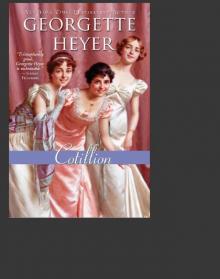 Cotillion
Cotillion Frederica
Frederica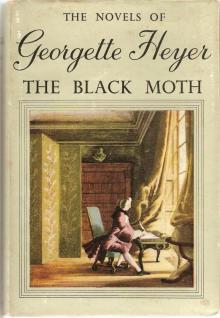 The Black Moth: A Romance of the XVIIIth Century
The Black Moth: A Romance of the XVIIIth Century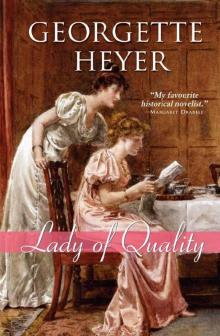 Lady of Quality
Lady of Quality Snowdrift and Other Stories
Snowdrift and Other Stories An Infamous Army
An Infamous Army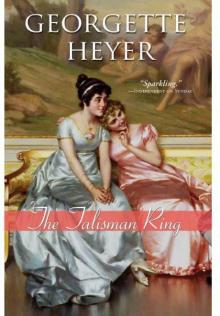 The Talisman Ring
The Talisman Ring Venetia
Venetia The Quiet Gentleman
The Quiet Gentleman Duplicate Death
Duplicate Death Cousin Kate
Cousin Kate Black Sheep
Black Sheep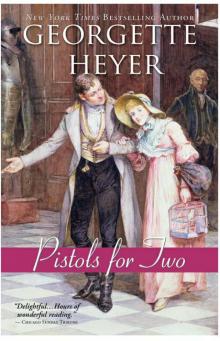 Pistols for Two
Pistols for Two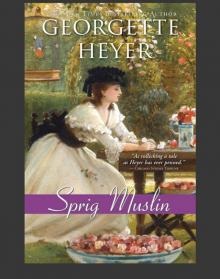 Sprig Muslin
Sprig Muslin No Wind of Blame
No Wind of Blame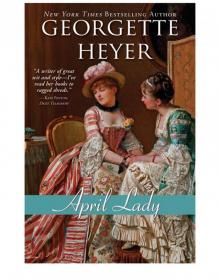 April Lady
April Lady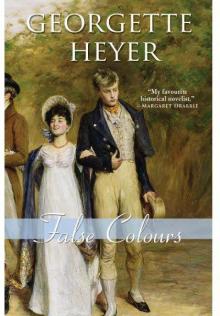 False Colours
False Colours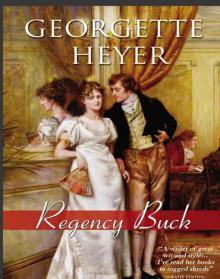 Regency Buck
Regency Buck The Toll-Gate
The Toll-Gate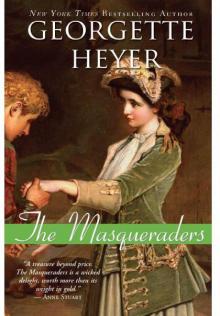 The Masqueraders
The Masqueraders The Unknown Ajax
The Unknown Ajax The Grand Sophy
The Grand Sophy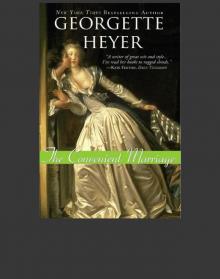 The Convenient Marriage
The Convenient Marriage Faro's Daughter
Faro's Daughter The Conqueror
The Conqueror The Foundling
The Foundling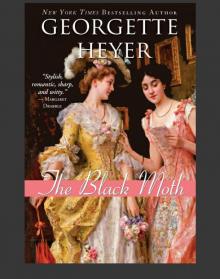 The Black Moth
The Black Moth The Transformation of Philip Jettan
The Transformation of Philip Jettan Friday's Child
Friday's Child Beauvallet
Beauvallet They Found Him Dead
They Found Him Dead Charity Girl
Charity Girl Death in the Stocks: Merely Murder
Death in the Stocks: Merely Murder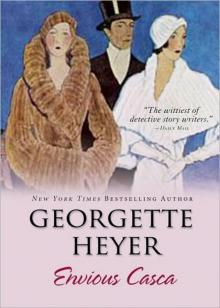 Envious Casca
Envious Casca Behold, Here's Poison
Behold, Here's Poison Arabella
Arabella The Nonesuch
The Nonesuch The Corinthian
The Corinthian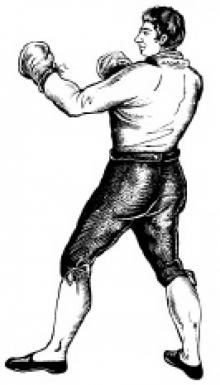 Jennifer Kloester
Jennifer Kloester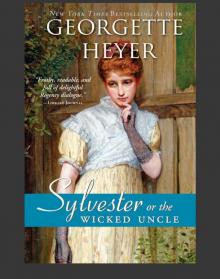 Sylvester
Sylvester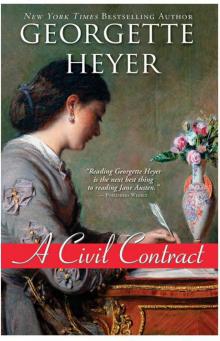 A Civil Contract
A Civil Contract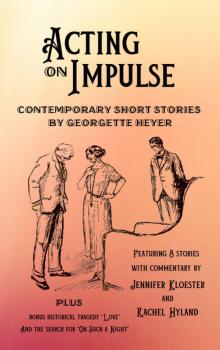 Acting on Impulse
Acting on Impulse Devil’s Cub at-2
Devil’s Cub at-2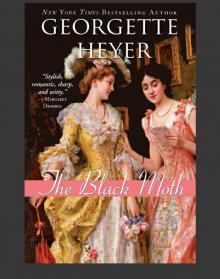 Black Moth
Black Moth Grand Sophy
Grand Sophy Instead of the Thorn
Instead of the Thorn Masqueraders
Masqueraders Corinthian
Corinthian Reluctant Widow
Reluctant Widow